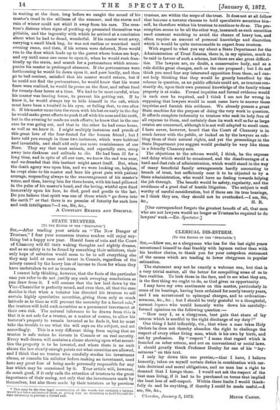STATE TRUSTEES.
[TO THE EDITOR OF THE .` EPECTATOR.1
SIE,—After reading your article on " The New Danger of Trustees," I fear your numerous trustee readers will enjoy any- thing but a happy new year. Horrid fears of ruin and the Court of Chancery will fill their waking thoughts and nightly dreams, and as no safety is to be found by consulting their solicitors, their only hope of salvation would seem to be to sell everything else they may hold at once and invest in Console, regardless of the misery caused by the heavy loss of income to those for whom they have undertaken to act as trustees.
I cannot help thinking, however, that the facts of the particular case you refer to do not justify any such sweeping conclusions as you draw from it. I will assume that the law laid down by the Vice-Chancellor is perfectly sound, and even then, all that the case decides is that when a testator has directed his trustees to sell certain highly speculative securities, giving them only so much latitude as to time as will prevent the necessity for a forced sale,* the trustees will hold such securities as a permanent investment at their own risk. The natural inference to be drawn from this is that it is not safe for a trustee, as a matter of course, to allow his testator's property to remain invested as he finds it, but he must take the trouble to see what the will says on the subject, and act accordingly. This is a very different thing from saying that no trustee is safe unless he invests in Consols or on real security. Every well-drawn will contains a clause showing upon what securi- ties the property is to be invested, and where there is no such clause the law clearly enough points out what securities are allowed, and I think that no trustee who carefully studies his investment clause, or consults his solicitor before making an investment, need have any great fear of being made personally responsible for any loss which may be occasioned by it. Your article will, however, do much good, if it only calls the attention of trustees to the great importance of their seeing, not only that the investments made by themselves, but also those made by their testators or by previous
• This may be the true legal construction of the words, but certainly a layman would not have understood them as giving him no discretion to hold beyond the time necessary to prevent a forced sale.
trustees, are within the scope of the trust. It does not at all follow that because a testator chooses to hold speculative securities him- self, he therefore wishes his trustees to continue to do so. The pre- sumption seems to be all the other way, inasmuch as such securities. need constant watching to avoid the chance of heavy loss, and often require an amount of personal knowledge and discretion, which it would be quite unreasonable to expect from trustees.
With regard to what you say about a State Department for the Administration of Trust Estates, there is, in my opinion, much to be said in favour of such a scheme, but there are also great difficul- ties. The lawyers are, no doubt, a conservative body, and as a rule dislike great changes, such as the one proposed ; but I do not think you need fear any interested opposition from them, mil can- not help thinking that they would be greatly benefited by the scheme in question, as no public officials could act, as trustees con- stantly do, upon their own personal knowledge of the family whose property is at stake. Formal inquiries and formal evidence would in each case be required, and 1 think I am not far wrong in supposing that lawyers would in most cases have to answer these- inquiries and furnish this evidence. We already possess a great State machine for the purpose of doing the very work in question.. It affords complete indemnity to trustees who seek its help free of all expense to them, and certainly does its work well so far as large estates are concerned, although it is not well adapted to small ones. I have never, however, heard that the Court of Chancery is in much favour with the public, or looked on by the lawyers as rob- bing them of their natural rights, and yet the proceedings in the State Department you suggest would probably be very like those in a friendly Chancery suit.
The objections to the scheme would, I think, be the expense and delay which would be occasioned, and the disadvantages of a hard-and-fast rule of administration, which would stand in the way of many beneficial family arrangements hardly amounting to breach of trust, but sufficiently near it to be objected to by a State administration, who would have no feeling towards helping the job through. The benefit would be safety, regularity, and the avoidance of a good deal of hostile litigation. The subject is well worthy of careful consideration, but if these are its true bearinga, as I think they are, they should not be overlooked.—I am, Sir,.
[Our correspondent forgets the greatest benefit of all, that men who are not lawyers would no longer as Trustees be required to do- lawyers' work.—ED. Spectator.]










































 Previous page
Previous page